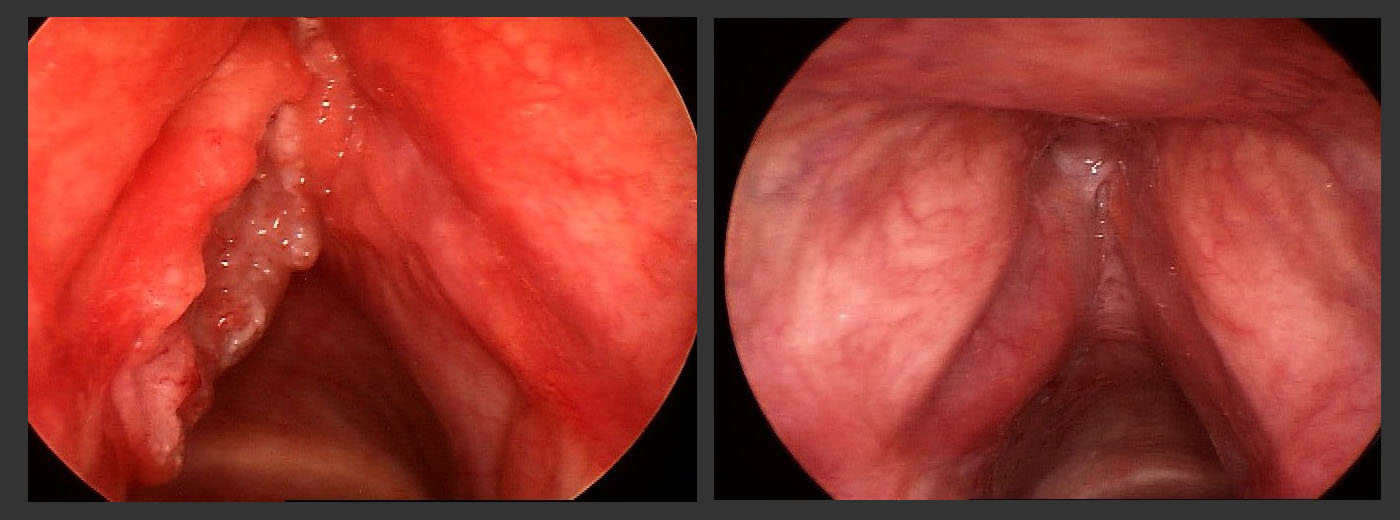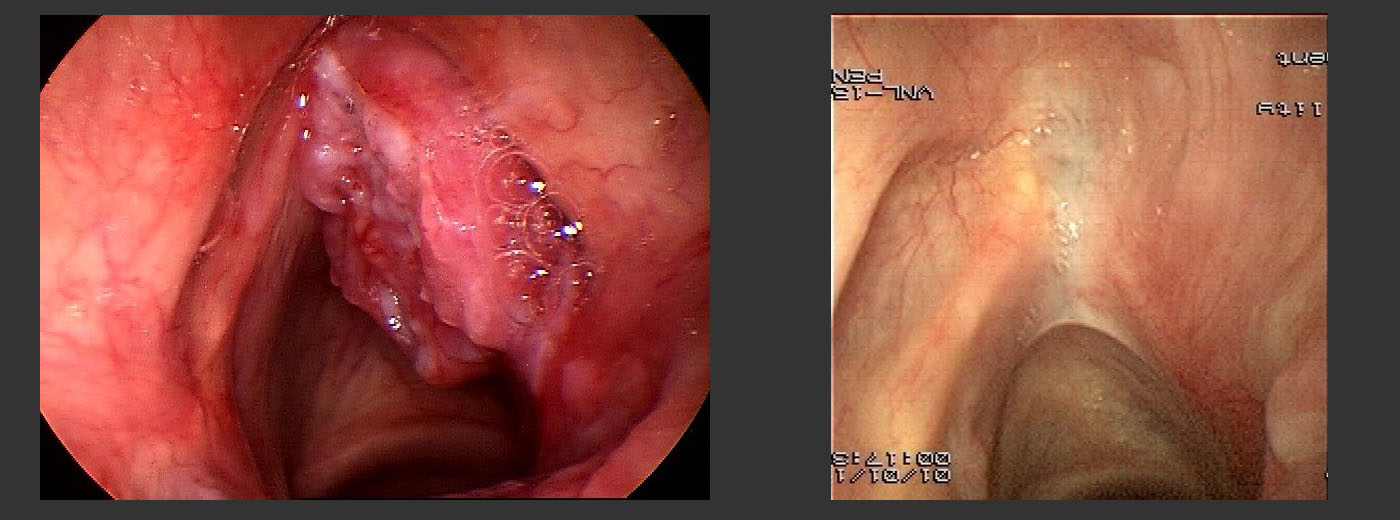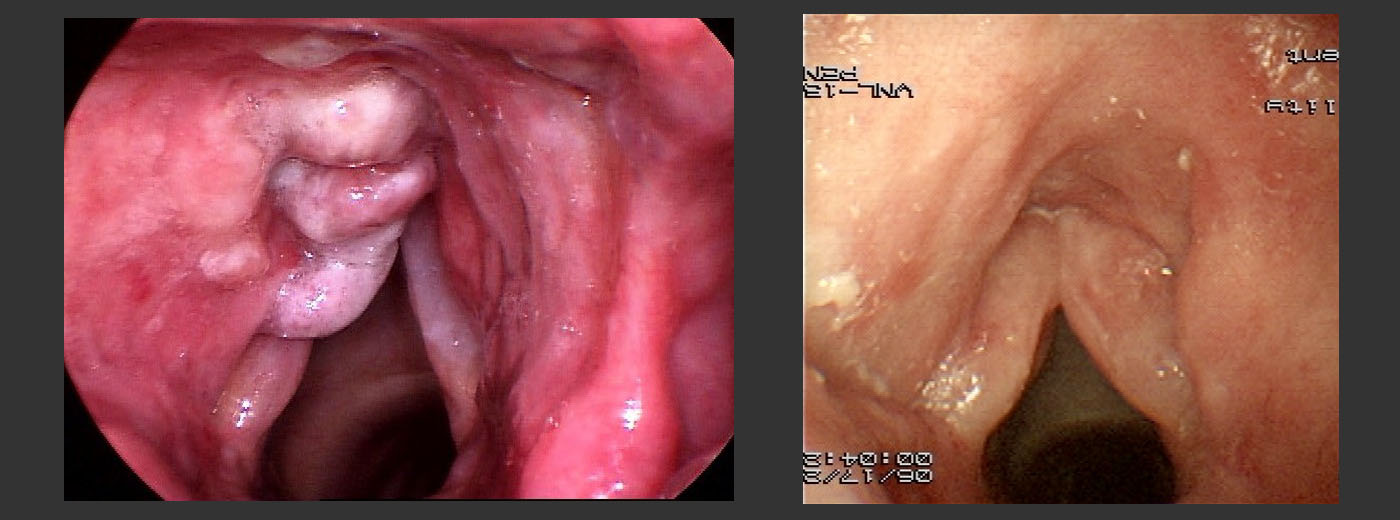Laryngeal Cancer Program
Contact Information
Laryngeal Cancer Program
Center for Laryngeal Surgery and Voice Rehabilitation
One Bowdoin Square, Floor 11
Boston,
MA
02114
Phone: 617-726-1444
Email: Voice_Center_2@partners.org
Explore This Program
About This Program
Physicians in Massachusetts General Hospital's Laryngeal Cancer Program provide a wide variety of services, including diagnosis and treatment for laryngeal cancer.
About the Condition
Laryngeal cancer is a malignant growth that typically starts on the surface membranes that line the voice box. It is usually squamous cell carcinoma. If left untreated, cancer can grow into the deeper tissues such as muscle and cartilage as well as certain types of laryngeal cancer are likely to metastasize, or spread to other areas of the body. The larynx (voice box) is divided into three parts:
- Upper (supraglottis)
- Middle (glottis, or vocal cords)
- Lower (subglottis)
While glottic and supraglottic cancer are equally common, subglottic cancer is rarer. Although most patients who get laryngeal cancer have smoked at some point in their lives, in recent years there are increasing numbers of non-smoking patients.
State-of-the-Art Care
The Mass General Center for Laryngeal Surgery and Voice Rehabilitation (Voice Center) is recognized nationally and internationally for its highly successful pioneering surgical techniques to preserve voice, swallowing, and breathing function in patients who develop laryngeal cancer. We have published this work extensively in peer-reviewed literature and in many textbooks, and have taught these techniques in medical centers throughout the United States and abroad. For this reason, individuals with laryngeal cancer often seek care at the Mass General Voice Center.
Treating Vocal Cord Cancer (Glottic Cancer)
The two conventional treatments for vocal cord cancer are surgery and radiation therapy. In most circumstances, small and mid-sized vocal cord cancer can be treated through the mouth (trans-oral or endoscopic) using a laser. We use a potassium-titanyl-phostphate (KTP) laser, a breakthrough technology pioneered for use in treating vocal cord cancer by the Mass General Voice Center team. We have treated vocal cord cancer patients with this instrument since 2005; this work was based an extensive basic science research and clinical experience with precancerous disease of the vocal cords (dysplasia). Use of the KTP laser has resulted in excellent voice results without compromising cancer cure rate.
We rarely use radiotherapy for small or mid-sized tumors due to our long-term experience and success with minimally invasive endoscopic laser treatment. While cure rates using radiation therapy can be as effective as for surgery, radiation treats the healthy parts of the larynx as well as those involved with cancer. For example, if a cancer involves only one vocal cord, laser surgery can preserve the other vocal cord completely, whereas the normal vocal cord tissue cannot be completely shielded from the effect of radiation therapy. In addition, radiation therapy can usually only be used once in the same part of the body, and it can be difficult to monitor for recurrence after a patient has received radiation. Finally, there can be substantial and sometimes debilitating side effects from radiotherapy, including:
- Airway restriction
- Difficulty swallowing
- Dry throat
- Voice changes
Patients who have recurrent vocal cord cancer, despite previous radiation treatment, may also be candidates for endoscopic management with the KTP laser.
As necessary, larger vocal cord cancers may require radiation therapy and/or need to be removed by open surgery through the neck. In collaboration with Mass General's Division of Thoracic Surgery, we have recently begun removing only the cancerous parts of the larynx in some patients, reconstructing the voice box and airway using part of an aorta from a deceased donor (aortic homograft reconstruction). This technique does not require special medications for immuno-suppression. While we are still in the early phases of studying this exciting new treatment option, it has offered an effective alternative to patients who would have formerly required a total laryngectomy (complete voice box removal). We have also successfully used this pioneering technique for management of airway stenosis (narrowing).
Treating Supraglottic Cancer
In our experience, supraglottic cancers are optimally managed with minimally invasive removal through the mouth, preserving the patient’s ability to swallow, breathe and speak while utilizing post-surgical radiation for larger tumors. The Mass General Voice Center has used and reported on this successful laser treatment approach for more than 20 years. More recently, Mass General surgeons have introduced new fiber-based lasers, which have greatly facilitated endoscopic resection of supraglottic cancer.
For more advanced supraglottic cancers, or for those that have failed radiation therapy, open surgery through the neck (as opposed to laser surgery through the mouth) may be required for cure. We are also experts in performing more conventional types of open conservation laryngeal surgery, removing only the parts of the voice box that are required by the cancer and reconstructing it so as to optimize voice, swallowing and breathing following surgical recovery. This procedure may avoid the need for total voice box removal (total laryngectomy).
Treating Subglottic Cancer
Depending on the stage, cancer in this part of the voice box can often be treated with either endoscopic laser surgery (using the KTP or Thulium lasers) or open surgery to remove part of the voice box. More advanced cancers may require more extensive surgery and/or radiation therapy. The aortic homograft reconstruction technique has been especially valuable to preserve voice and swallowing function for advanced subglottic cancer treatment.
Examples of Patients Before and After Treatment
A patient with a sizeable early vocal cord cancer is treated with the KTP laser instead of radiation.
Surgical Treatment of Early Glottic Cancer
Results of minimally invasive, trans-oral, KTP laser surgery for early glottic cancer.

An example of early glottic cancer, before (left) and after (right) treatment with the KTP laser.

An example of early glottic cancer, before (left) and after (right) treatment with the KTP laser.

An example of early glottic cancer, before (left) and after (right) treatment with the KTP laser.

An example of early glottic cancer, before (left) and after (right) treatment with the KTP laser.

An example of early glottic cancer, before (left) and after (right) treatment with the KTP laser.

An example of early glottic cancer, before (left) and after (right) treatment with the KTP laser.

An example of early glottic cancer, before (left) and after (right) treatment with the KTP laser.
Surgical Treatment of Supraglottic Cancer
Results of minimally invasive, trans-oral laser surgery (sometimes followed by radiation therapy), for treatment of supraglottic cancer.

A patient with supraglottic cancer, before (left) and after (right) surgical treatment.

A patient with supraglottic cancer, before (left) and after (right) surgical treatment.

A patient with supraglottic cancer, before (left) and after (right) surgical treatment.

A patient with supraglottic cancer, before (left) and after (right) surgical treatment.
Subglottic Cancer

A Top Hospital in America
Mass General is recognized as a top hospital on the U.S. News Best Hospitals Honor Roll for 2024-2025.
Learn More
Massachusetts General Hospital's Laryngeal Cancer Program offers comprehensive and innovative treatments for laryngeal cancer.
